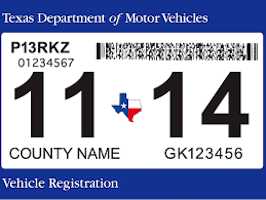“Everything you need to know to about Texas Car Registration”
 What do I need to do for Texas Car Registration? The State Law Requires You to Register and Title Your Vehicle in Texas if:
What do I need to do for Texas Car Registration? The State Law Requires You to Register and Title Your Vehicle in Texas if:
- You need to establish residence, or,
- You become gainfully employed.
Your vehicle may be operated with current out-of-state license plates for 30 days. Immediate registration is required at the end of such 30-day period.
You are not required to register and title your vehicle in Texas if:
- You are a nonresident member of the U.S. Armed Forces or,
- You are a nonresident student attending an accredited Texas college or university on a full-time basis. Part-time employment is allowed. NOTE: However, your vehicle must display valid license plates and remain currently registered.
Before you register your vehicle in Texas, it must pass a vehicle safety inspection and vehicle identification number inspection made by a state appointed safety inspection station. A Form VI-30-A, Vehicle Identification Certificate certifying the correct vehicle identification number will be completed by the inspection station. This form must be submitted to the County Tax Assessor-Collector along with your evidence of ownership, valid proof of liability insurance, application for registration and certificate of title.
How to Register your Car in Texas.
Texas Titles
Your application for certificate of title and vehicle registration must be filed with the County Tax Assessor-Collector’s office located in the county where you reside.
You are required to submit the following items with your application.
- An out-of-state title or foreign ownership document
- Vehicle Identification Certificate, Form VI-30A
- Valid proof of financial responsibility in the form of: a. a liability insurance card b. an insurance policy c. an insurance binder, or d. certificate of self insurance
- Your vehicle’s current odometer reading, if the vehicle is less than 10 years old
- If your vehicle is from a foreign country, a bond release letter from the U.S. Department of Transportation(DOT) may be required, confirming that the vehicle conforms with federal safety standards, and 6. If your vehicle has not been previously registered by you in another state, sales or use tax verification is required.
Texas Car Registration and title forms are available at your local County Tax Assessor-Collector’s office.
To save yourself time and trouble, you may wish to telephone your county tax office beforehand. The following questions may be helpful.
- Where is the local County Tax Assessor-Collector’s office located?
- What are the normal office hours?
- What is the exact cost to register and title my vehicle?
Auto Insurance
You cannot legally operate a motor vehicle in Texas without liability insurance coverage. You must present valid proof of liability insurance coverage to receive or renew your:
- Motor vehicle registration
- Driver’s license
- Vehicle safety inspection
Acceptable evidence of such proof may be an original or photocopy of one of the following: a liability insurance card, an insurance policy, an insurance binder, or a certificate of self-insurance.
The minimum amounts of coverage prescribed by Texas law are: $30,000 bodily injury to or death of one person in any one accident, $60,000 bodily injury to or death of two or more persons in any one accident, subject to $30,000 limit for one person, up to $60,000 per accident because of injury in any one accident and up to $25,000 for property damage.
Vehicle Safety Inspection
Every car, truck, bus, motorcycle, moped, trailer, semitrailer, pole trailer, or travel trailer registered in Texas and operated on a public roadway must display a valid vehicle inspection certificate at all times. Trailer-type vehicles with a gross weight of 4,500 pounds or less are exempt.
Vehicle inspections are conducted at official state appointed vehicle inspection stations.
Defects disclosed during the inspection may be corrected by the vehicle owner or by a repair facility of the owner’s choice. When a vehicle passes the inspection, an inspection certificate displaying the month and year of expiration will be affixed to the windshield. The windshield certificate expires 12 months from the date of the inspection
Getting a Texas driver’s license
If you are a driver establishing residence in Texas, you are required to obtain a Texas Driver’s License within 30 days.
You may apply for a driver’s license at any Texas Department of Public Safety Driver’s License Office. By law, if you are required to take the driving test when applying, you will be required to present proof that your vehicle has been registered in Texas along with valid proof of liability insurance.
When making initial application, you must present a certified copy of your birth certificate or other qualified evidence which documents the date of your birth.
At the time you make application, you must pass an examination for vision, rules, signs, and driving skills. Your thumb prints are required at this time.
To prepare for the driver’s license examination, a driver’s handbook containing all of the necessary information is available at any Texas Department of Public Safety office.
Proof of Driver Education Completion and parental authorization is required for minors ages 15 through 17.
For further information about driver’s license fees and vehicle safety inspection, you may wish to contact your local TX Department of Public Safety office or headquarters in Austin at (512)424-2000.
Overview-Texas Car Registration
STEP 1: Obtain Texas Insurance.
STEP 2: Get a vehicle safety inspection, which can be done in a garage rlocal service station.
STEP 3: Take the vehicle inspection certificate, evidence of ownership, and proof of insurance to the county courthouse.
For More Information on Texas Car Registration:
Texas Department of Transportation (www.dot.state.tx.us)
Texas Online (Auto Registration) (www.texasonline.com)


 Obviously your emotions–your feelings about driving and your preference for certain auto makes or models–will play a role in the decision process. But, the smartest place to start is by thinking about you and your needs. To be sure you make the smartest choices, you’ll need to do some homework. We put together some car buying tips to consider.
Obviously your emotions–your feelings about driving and your preference for certain auto makes or models–will play a role in the decision process. But, the smartest place to start is by thinking about you and your needs. To be sure you make the smartest choices, you’ll need to do some homework. We put together some car buying tips to consider.